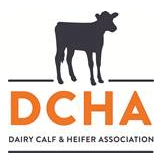
DCHA Tip of the Week: Sustain performance during cold weather
 The calf's average body core temperature is about 102 degrees F, and its "thermal neutral zone" is 60 to 80 degrees. When the mercury drops below 60 degrees F, calves start diverting energy away from growth and disease prevention.
The calf's average body core temperature is about 102 degrees F, and its "thermal neutral zone" is 60 to 80 degrees. When the mercury drops below 60 degrees F, calves start diverting energy away from growth and disease prevention.Here are some ways producers can combat the effects of cold stress.
Make sure mama is well nourished. That results in more warming fat and better quality colostrum for calves.
Feed more energy. Whether it's feeding more milk replacer, increasing the dry matter content of the milk replacer or adding an extra feeding, calves need more energy in winter months. Adding grain to the calf's diet, early on, also boosts energy.
Shield them from wind and drafts. Provide places where the calf can escape the wind, especially places they can lie down and expose less body surface.
Invest in warm bedding. Provide 3 inches of dry, comfortable bedding with good insulating properties. If bedding is adequate, the calf's feet should not be visible when lying down.
Heat milk and water. When calves drink cold milk, replacer or water, their body must warm it to 102 degrees F. So, warm liquids to body temperature and measure it with a rapid-read thermometer.
Supplement with StressMate. StressMate from AgriLabs can help to shore up calf's health by providing essential small proteins called bioactives. Bioactives are a broad spectrum of widely studied small colostrum proteins that:
- Inhibit pathogen functionality
- Stimulate immune functions and cell growth and
- Modulate the natural defense system
This DCHA Tip of the Week has been sponsored by AgriLabs.
11.21.2013